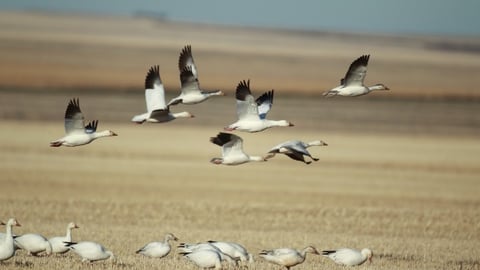Farmers guard against avian flu
Local egg producers and chicken growers are on high alert for the highly pathogenic avian influenza (H5N1) in farmed birds. Commonly known as "bird flu,'' the contagious viral infection can affect several species of food-producing birds including pet birds and wild birds.
The Canadian Food Inspection Agency (CFIA) is working with industry producers to prevent the flu from spreading while containing outbreaks across the country. There are cases in southern Ontario, Minnesota, and Manitoba. Anyone with farm animals must practice good biosecurity habits.
In Thunder Bay, farms need high standards of biosecurity year round for prevention of all risks, including avian flu. Stricter guidelines include more sanitizing measures and restricted areas for deliveries.
Tyler Breukelman, co-owner of Vanderwees Farms and Thunder Bay Feeds, says the Vanderwees Farm serves as a distributor and no longer farms poultry for egg production. They are also the local egg grader for local producers.
"We purchase all of our eggs from Steinbach, Man., and we have our own trucking system to get them here,'' he said. "We have another company called Thunder Bay Feeds where we manufacture animal seeds and we sell day-old chicks through there as well as live full grown chickens."
Breukelman works with two hatcheries, one in Steinbach, Man., and one in southern Ontario, neither of which are inside the infected areas, making it safe to bring the animals into Thunder Bay. If a hatchery was in a quarantined area, all distribution from there would be halted with nothing coming in or out of the facilities.
"Last year, we were able to go down (to Manitoba) with our trailer and I could walk into their barn, talk to the farmer who helped me load the truck and I would handle the chickens myself,'' he said.
"This year, before going down there I needed to disinfect the inside and the outside of my truck and my trailer at our facility here. The crates that the chickens are going into all have to be disinfected here. Once I arrive in Manitoba, I have to go through the whole process again of disinfecting the cages. Once I pull into the farmers yard they have to disinfect the outside of my truck and when I am backed up to the facility I'm actually not allowed to step into the barn at all or handle the birds until they are loaded into my trailer.''
Breukelman says there is an extra heightened sense that something is happening but for the most part all normal biosecurity procedures are in place and it's not anything that they're not used to.
Avian influenza is spread through a fecal-oral route. Birds become infected through direct contact with feces or secretions of infected birds, infected food, contaminated surfaces and water supplies. Wild birds can transfer the virus by their feathers, feet or dander.
"There's always a level of concern,'' says Breukelman. "We could have a flock of geese fly over Thunder Bay and a handful of them are infected and now it's in the soil where they've done their business. Another bird picks it up, flies to a small farm and does the same thing in their field where their chickens go. So there's always that level of risk and concern.''
Breukelman credits the Chicken Farmers of Ontario (CFO), which oversees all the poultry operations, with providing valuable information for farmers on prevention and biosecurity measures.
Jon Hollway and his wife Ali operate Corbett Creek Farm and partner with Morning Moon Farm to bring people their signature meat and vegetable program. Their customers receive a box of vegetables every two weeks and a box of meat every month from what is available from their farm seasonally, through the summer. Hollway is arming himself with a solid education around avian influenza and takes part in many webinars to learn more.
"This is our first year doing artisanal chickens and yeah, we're definitely monitoring things and doing everything that is recommended,'' he said, adding that they produce beef and pork at their farm as well. "There's new measures in terms of limiting exposure with other firms and biosecurity stuff that we do anyways, and we are definitely going to make sure that we do our best to limit any exposure.''
Over at the family operated Tarrymore Farm, grower Jenny Groenheide says the avian flu "isn't an issue (for them) at this point.
"It mainly comes in with the migratory birds and we don't have a lot of those in our area _ and our chickens are contained. They're not outside,'' said Groenheide. "Unless they're mingling with the wild birds, or being able to pick up bird droppings or anything like that, there's not a very good chance of being infected.''
She added that the big thing, as with any flock of chickens, is you have to practice good biosecurity protocols.
And that's something that we've done as long as we've had birds,'' she said.
Protocols on her farm are similar to other area farms and include non-access to barns if you are not a worker on that farm. Different boots or shoes could potentially be a biohazard risk if entering the barn.
You have to follow good biosecurity protocols, make sure your boots are clean, make sure the equipment you're using, like shovels and whatever in the barn, hasn't been outside with the potential of them becoming infected in any way,'' she said. "We don't let people in our barn and, by the same token, we don't go in somebody else's barn.''
Groenheide is confident in the local Ontario Ministry of Agriculture, Food and Rural Affairs representative who keeps them abreast of any risks. She says. "You need to pay attention to those people that are helping you in your industry. We can lean on those people to be our source of early warnings.''


